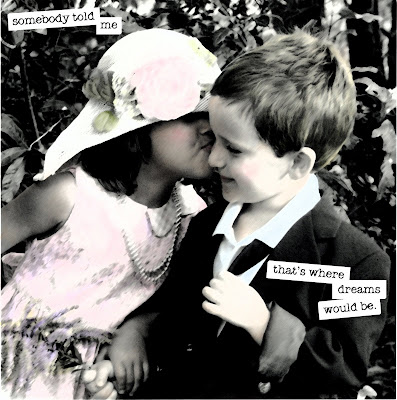The first few minutes are perhaps the most difficult. He sort of loses himself in her departure, standing there for several long moments, not completely aware of his thoughts or surroundings. A train has arrived and travelers are rushing past him, tired and eager to reach their destinations. One impatient, highly-strung woman is annoyed at the apparent complete lack of consideration of the boy who stands at ease, blocking the way. Accidentally-on-purpose she drags the wheels of her enormous suitcase across his foot. This wakes him from his conscious slumber and, remembering where he is, he turns and moves sleepily forward with the flowing crowd. In his mind he repeats her name to himself as he walks, kneading each syllable until they melt together, forming a single sound; a perfect harmony.
He is on the street now, without any real idea of where he is going. It is late summer, an uncomfortably hot day. Though it is still morning he can feel the sun beating down upon the back of his neck. He had dressed in haste yet with thought; her favorite shoes of his land rhythmically upon the pavement. He wears a becoming white t-shirt, well-fitted jeans, and carries a light jacket in hand (he thought it might perhaps be cool today). His free hand is raised without direct intention, lands at his hairline, and travels the length of his head once or twice. He likes the feeling of his short hair against his palm, and the memories the movement conjures – memories of resting with his head on her stomach, of her rubbing his hair as he does now – are comforting.
The blistering sun creates mirages of puddles on the pavement. The humidity has made the air thick – Graham can imagine suffocating in the heat. The leaves find themselves without dance partners in the absence of a breeze. He is some distance from the station, now – the sidewalks have narrowed and are less busy. He watches his feet as they carry him, and he thinks of her. He thinks of all he shared with her. Remembering something that once made him tear with laughter, he giggles to himself then looks around nervously, afraid that he may appear to be mildly insane. He watches a car as it approaches him. The driver is a woman, clown-like (he briefly wonders how much her face cost), talking animatedly on a cell phone. As the vehicle passes, Graham is flipped off by who he assumes must be this woman’s son. Perhaps around eight, the boy gleefully bites his tongue and waves both middle fingers at the innocent stranger on the street. Graham is taken aback; he sort of scoffs, unsure whether or not he wants to laugh. In the moment of minor shock and confusion, he has lost sight of his happy memories. He thinks instead of their goodbye.
The previous night she had sat on the side of her bed and watched him as he claimed his jacket from its spot on her bedpost and put it on. He then presented himself before her and they briefly touched hands before he bent slightly and she raised her head to be kissed by him. They were different kisses, different than before – slow and soft. They made him feel sad and it suddenly dawned on him that she was leaving. He took a seat next to her and she stood in front of him. “It’s late,” she said. He looked up at her and then he wrapped his arms around her waist and placed his head against her stomach. She stood there, being hugged by him, looking down at him, loving him.
They kissed again. Graham smiled, “You smell like sunscreen – ” she half-giggled and shot him a quizzical glance, “I really like it!” Then, holding his hand, she walked him to the door. She watched him slip into his shoes, “I’ll miss you.” He stood, he pulled her into him and held her there for several moments, kissed her one last time, and then he was gone. As she stood in the open doorway, leaning dazedly against the frame, she came to know every piece of the universe.
* * * * * * * * * * * * * * * * * * * * * * * * * * * * *
Evey LaForte suddenly finds herself in adulthood. She sits with legs crossed and good posture, hands folded on her lap, feeling very self-important. She is dressed like an adult, like how she thinks adults dress. She watches passengers walk the platform and smiles pleasantly at passers-by. She can feel it; she is a woman now! She feels others know it too, and this knowledge somehow changes her, changes her behavior. She is like the little girl who dresses in her mother’s heels, pearls, and lipstick, role-playing adult.
The sight of Graham lamely waving at her from outside, and the simultaneous lurch of the train as it leaves the station, knock her back to reality. She can do nothing but stare at him, and it takes her a moment even to find a smile to offer. It is unsettling to be confronted by him; she made her decision months ago, and she is sure of it, yet as her thoughts drift back to him she smiles sincerely and feels like she’s falling. A part of her – perhaps the wisest part – knows that she should stay with him, but she stifles the voice of it.
It takes her until he is out of sight to disregard his ambush. She forces the thought of him from her mind.
With bold confidence she marches strongly into her future. She’s known it would come to this for some time – she never really saw it any other way; the life she envisioned for herself lies elsewhere, beyond Graham.
Landscapes flutter past and as she watches them she looks not fondly back upon the year she spent with Graham but instead, ahead to the future. With harsh, rather forced indifference, she separates herself from her past. She severs all ties to Graham and races surely forward.
* * * * * * * * * * * * * * * * * * * * * * * * * * * * *
He feels vulnerable. He knows… in his heart he knows it – he has lost her. She will never call. He knows that the last image he will ever have of her is the sight of her in the window.
She is gone; she has left him.









